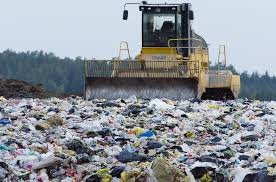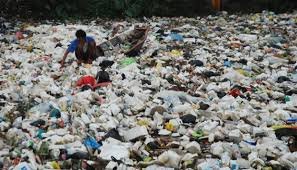
Waste becomes a serious problem especially in urban areas. For example, factory waste is discharged into the surrounding environment resulting in air and groundwater contamination, in addition to these problems there are landfill and TPS that are not properly managed so that the source of animal and disease-carrying bacteria.
Along with the passage of time, population growth, and technological development, resulting in increasing the type and volume of waste, so not all the waste residents served by public facilities waste processing As a result some people are looking for their own way out by burning it, or throw away the river which is certainly not a way out good, because it will further exacerbate environmental damage. The number of industrial plants is increasing and the population of Indonesia living in urban areas is increasing from year to year. The concentration of industrial factories and residents in the urban areas makes the environmental capacity to absorb pollutants decreases.
The higher the socioeconomic conditions of society, the more the per capita amount of waste is discarded. The quality of waste is a lot that is not biodegradable. Changes in the garbage, depending on available materials, regulations and public awareness of waste issues. This increase in welfare will increase the construction and renewal of buildings, transportation, agricultural products, industry, and others. As a consequence of all that will add volume and type of waste.
Technological advances will increase the quantity and quality of waste, due to the increasingly diverse use of feedstock, packing methods and manufacturing products.
The development of urban settlement environment can not be separated from the rapid rate of population growth due to urban population growth factor itself and urbanization factor. The negative impacts of urbanization that have been going on for more due to the unbalanced opportunity to earn a living in rural and urban areas, thus raising the attraction of the city that is considered capable of providing a better future for rural or out-of-town communities, while the background of capacity and the ability of the immigrants is very marginal.

In addition, as a result of the increasing levels of public consumption and other activities, the waste also generated. The waste becomes an environmental problem because the quantity and level of danger can disrupt the lives of other living things.
Handling of waste is still done conventionally can not control the existing waste. Waste that is not handled properly can cause various health problems. Smelly pollution from rotting garbage, water pollution from waste disposal to rivers and leach of leachate from landfills and factory wastewater to settlements and water sources, as well as air pollution from factory smoke and motor vehicle fumes and garbage burning.
River water pollution due to waste disposal also has a negative impact on human health, especially with increased diarrheal diseases and the cost of processing raw water for drinking water continues to increase. Even often, especially in the dry season, the quality of raw water has been heavily polluted as a result difficult to be processed into drinkable water, so that raw drinking water must be imported from other sources.
The effects of waste on health can be grouped into direct and indirect effects, as follows:
Direct effect; effects caused by direct contact with the waste. For example toxic waste, corrosive waste to the body, carcinogenic, teratogenic, and others. In addition there is also a waste containing pathogenic germs, so it can cause disease. Jg toxic waste will have a direct impact on humans such as poisoning and even death. this waste can come from household waste other than industrial waste.
Indirect effects; these indirect effects can be felt by society due to the process of decomposing, burning, and disposal of waste. Waste decomposition is usually aerobic, continued facultatively, and anaerobically when oxygen is depleted. Anaerobic decomposition will produce leachate (leachate) along with gas. In the leachate contains pathogenic microbes, heavy metals and other harmful substances. In addition, other indirect effects can be vector-borne diseases that multiply in the waste.
Diseases that are caused by waste very much and can be non communicable diseases, infectious, potential fire, poisoning, and others. Berikurt merupaka some diseases
Waste if not managed properly can result in disasters, namely:
The source of the disease
Environmental pollution
Dead
Inadequate site and treatment of waste (uncontrolled waste disposal) is a suitable place for some pathogenic organisms such as flies and mice that can infect illnesses, such as human health hazards such as: diarrheal disease, typhoid, and even dengue fever due to viruses comes from waste with improper processing can mix with drinking water.
Household waste in addition to human health, the waste is also very influential on the sustainability and the environment around us. An example of household waste is the use of detergent for washing, the washing water is then disposed of by the elegance and seeps into the ground water, the sewer water flows into the river and so forth. Due to the presence of these household wastes it will be very harmful to the preservation of the surrounding environment. Decomposition of waste discharged into water will produce organic acids.
An integrated waste management system is appropriately assessed and applicable to solve waste problems, technological waste handling will not be complete only by applying a single method but must be combined with a variety of methods known as the Integrated Waste Management System. The Integrated Waste Management System at least combines waste reduction, recycling & reuse, composting, incineration and landfilling approaches.
Reduction of industrial waste sources means the need for non-waste processing technology as well as compact / minimal packaged products and environmentally friendly. While for households it means to instill a habit of not being wasteful in the use of everyday items. For recycling and reuse approaches applied especially to non-organic waste such as paper, plastic, aluminum, glass, metal and others. As for organic waste eg dry leaves can be recycled, one of them with composting.